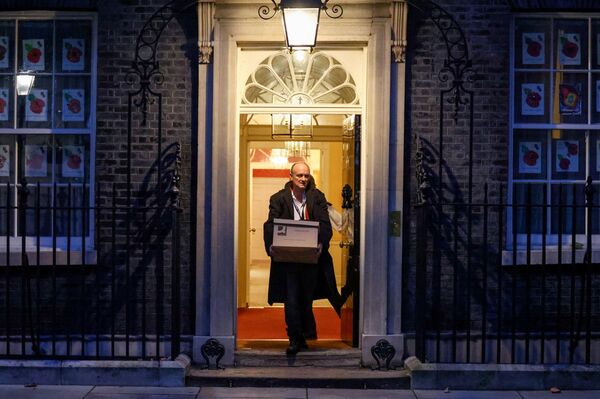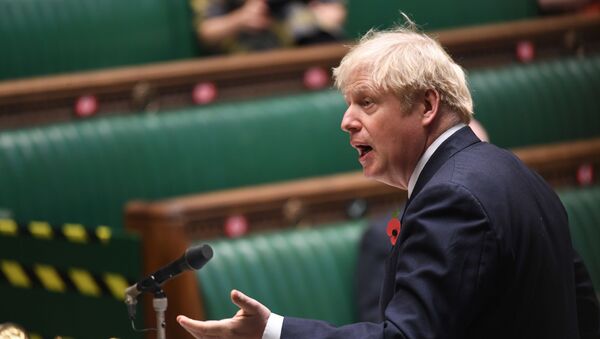Boris Johnson's Standards adviser Sir Alex Allan stepped down on 20 November, after the UK premier judged that his Home Secretary Priti Patel had not breached the code governing ministers’ behaviour, despite an inquiry that found to the contrary.
Having mentioned that it's up to the Prime Minister to decide whether Patel's actions amount to a breach of the ministerial code, Allan said he felt it was "right" that he should resign from his position as Johnson's independent adviser on the code. For her part, Patel, who has repeatedly denied that she had intentionally bullied her subordinates, apologised for upsetting people in the past. Earlier this year, her Permanent Secretary Sir Philip Rutnam quit after accusing Patel of a “vicious and orchestrated briefing campaign”.
'Johnson's Gov't Appears to be in a Real Mess'
"I think that the resignation this morning of the author of the report is a very serious matter indeed," says Franco Rizzuto, professor of European law at Edge Hill University. "The Prime Minister risks demolishing what little remains of the credibility of his Government. This will be seen as yet another example of the rules not applying to members of his inner circle. Little wonder that there is a real problem with rule compliance in the UK. [This is] yet another confusing signal from an at times very confused PM and his inner circle."
Rizzuto is inclined to believe that the incumbent Home Secretary indeed broke the rules. He cites the fact that three years ago Patel was sacked by then Prime Minister Theresa May over not informing the latter about additional secret meetings she held with Israeli politicians in breach of the ministerial code.
According to Allan's report, Priti Patel's behaviour could be "described as bullying in terms of the impact felt by individuals", ie it made them feel "uncomfortable, frightened, less respected or put down".
"It is very worrying that a senior minister like Patel lacks the minimum of self-awareness to realise that civil servants are not ‘owned’ and can be ‘used and abused’ by their ministers," he says. "This matter will not go away and the accusation of double standards will, in my view, stick. Remarkable to think that only less than a year ago the Prime Minister was regarded as the saviour of the Conservative Party. The Government appears to be in a real mess thanks to his failings".
What's worse, the premier's Brexit inner circle is seemingly falling apart, he suggests. Indeed, Allan's resignation came on the heels of the departure of Prime Minister's chief adviser Dominic Cummings - often referred to as the Brexit architect - and Downing Street Director of Communications Lee Cain.

'British PM Trying to Save His Brexit Inner Circle'
Presently, the UK government and the EU leadership are locked in a trade dispute over fishing rights, competition rules and a number of other issues as a December deadline nearing. The UK's post-Brexit transition period ends on 1 January 2021.
Johnson is trying to shield his inner circle at all costs in order to save their Brexit vigour, suggests Mark Garnett, a politics professor at Lancaster University, while commenting on Johnson's defence of Patel.
"I would say that Boris Johnson seems to have made it a rule that none of his cabinet ministers should ever be forced to resign," he says. "This is partly because he values personal loyalty, but also because his cabinet mainly consists of people who are identified with his key policy - 'Brexit' - and if any one of them leaves the Government this might be seen as a serious setback for his approach to leaving the EU."
However, Johnson's approach is double-edged since, if ministers have no fear of being dismissed, whatever their offences, they have a licence to do whatever they want, according to Garnett, who believes that this situation will have long-term implications.
"This risks making the Government even more unpopular, and increases the chances of a heavy Conservative defeat at the next general election," the academic stresses. "As a result, more MPs who fear losing their seat will now be talking about a change of Prime Minister, most likely in May, when there are several important elections."
Nevertheless, British academic and political economist Rodney Atkinson takes an opposing view: he argues that Johnson's decision to stand up for Patel was right, adding that the Home Secretary has the support of the British people in general and her party’s members.
"Priti Patel – unlike the civil service and much of the British political establishment – has accepted and seeks to implement the will of the British people as expressed in the 2016 referendum and in two general elections," Atkinson emphasises. "She may have been forceful or tactless but it is her job to get the Home Office to solve extremely serious and urgent crises - such as mass illegal immigration and murderous religious extremism.
"Most of the British political and state establishment is learning for the first time what democracy is," the political economist concludes.


